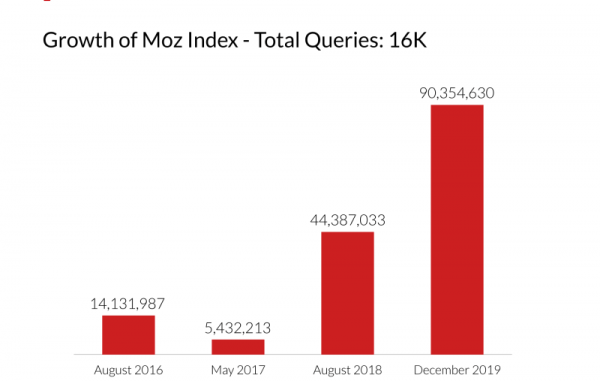
Here are the results from the fifth of our “Links as a Ranking Factor” studies. We conducted the first of these studies in May 2016 and have been tracking the same query set over time to measure any material shifts in the role of links. In this year’s study, we also expanded our examination of different market sectors to see how the role of links may vary by market sector.
We have also increased the number of queries we’re examining over time. We did that to ensure we had enough data for the market sector analyses to be meaningful. The breakout of the month for each of our studies, and the number of queries examined per study are as follows:
May 2016 – 6K queries
Aug 2016 – 16K queries
May 2017 – 16K queries
August 2018 – 27K queries
December 2019 – 32K queries
Each of the query data sets includes the original query sets from the earlier studies, so we’ll show an apples-to-apples comparison of those results, as well as the larger-scale results from our latest study, in which the data was pulled in December of 2019. As a bonus, for the second year in a row, we’ll also comment on the increases in quantity of the links provided, and the quality of the DA/PA metrics, from Moz Link Explorer.
The Results
As with our prior studies, we received the gracious support of Moz, who allowed us to access Link Explorer to pull the data for our study. Please note that the Moz team did not ask us to do this study, they did not pay us, or even ask us, to score the accuracy of their tool or its metrics. There is no quid pro quo—we chose to do this on our own.
That said, our data shows that the size of the Link Explorer link index continues to grow dramatically:
Number of Links to a Page as Ranking Factor
For the link study itself, the first set of charts that we’ll look at is based on the total number of links pointing to the ranking page. For these, we calculated the Quadratic Mean Correlation score. Jump down to the methodology section to see what a “Quadratic Mean Spearman Correlation Score” value actually means. Here’s a look at that data for 6K queries across all four instances of the study that we’ve run to date:
Note that the same 6,000 queries for this chart were used in all five data sets. This data shows some decline over time, particularly in the past year. However, as shown below, there’s reason to believe Google’s measurement of links as a ranking factor is evolving.
Beginning with the second study, we upped the query count to 16,000 queries. We carried that same set of 16K queries through to this year’s edition of the study. These are the correlation scores for the four data sets of 16K queries:
Once again, we see a decline here in the weight of links in the latest version of our study.
With the fourth of our studies, we upped the number of queries to 27K results. We did this to do additional segmentation of the data (more on that in a bit). This is what we see over the 2018 and 2019 data sets (the last two years):
Finally, we increased the query count to 32K in the data we pulled in December of 2019. The reason for this latest expansion is that while we did some segmentation of the data in the 2018 data set (in the study we published in early 2019), we felt that we could use more queries to make those segments more robust. These are our results:
One of the more notable findings we saw in last year’s study was that for the first time, the Moz DA and Moz PA were better predictors of ranking than the total link count. We tested that again this time around, too:
As we saw last year, DA and PA are both better predictors of ranking position than the total link count. Domain Authority (DA) appears to be the best metric. This suggests that the “authority” of the site providing a link matters a great deal.
Links to a Page as Ranking Factor by Query Type
As with prior studies, we compared the total link correlation for commercial and informational queries. However, in analyzing our December 2019 data we also showed weighing DA and PA split into those categories as well.
Continue reading the full study at: https://blogs.perficient.com/2020/04/16/do-links-still-matter-for-seo-in-2020/
The post Do Links Still Matter for SEO in 2020 appeared first on SiteProNews.
Source: Site Pro News
Link: Do Links Still Matter for SEO in 2020


